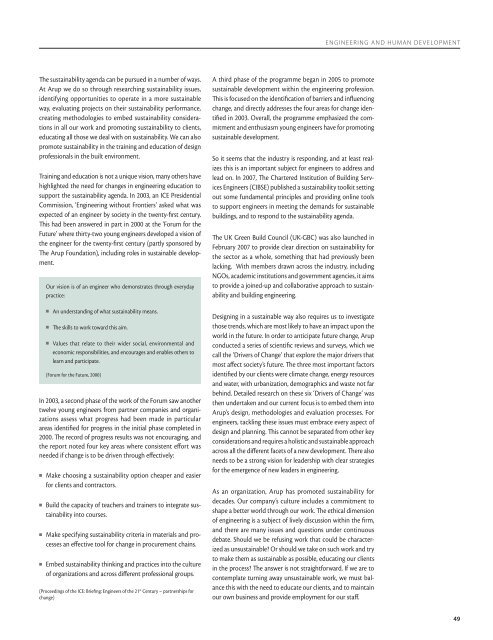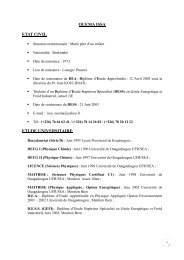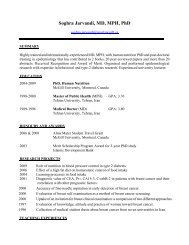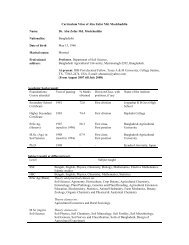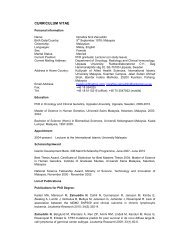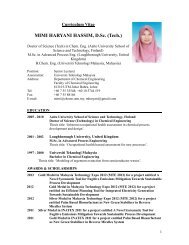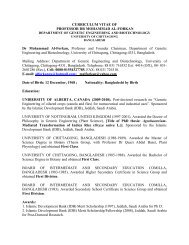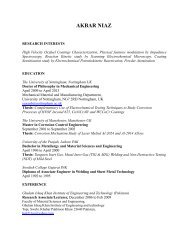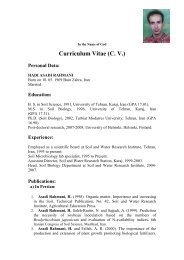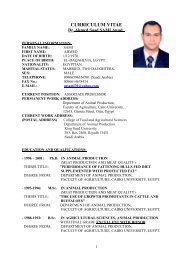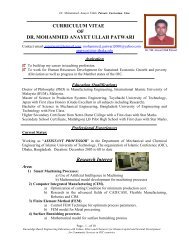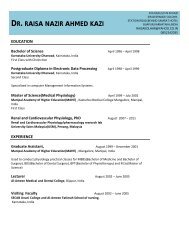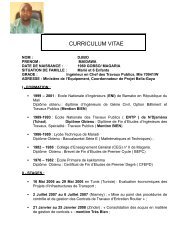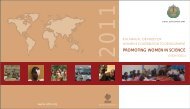Engineering: issues, challenges and opportunities for development ...
Engineering: issues, challenges and opportunities for development ...
Engineering: issues, challenges and opportunities for development ...
Create successful ePaper yourself
Turn your PDF publications into a flip-book with our unique Google optimized e-Paper software.
ENGINEERING AND HUMAN DEVELOPMENTThe sustainability agenda can be pursued in a number of ways.At Arup we do so through researching sustainability <strong>issues</strong>,identifying <strong>opportunities</strong> to operate in a more sustainableway, evaluating projects on their sustainability per<strong>for</strong>mance,creating methodologies to embed sustainability considerationsin all our work <strong>and</strong> promoting sustainability to clients,educating all those we deal with on sustainability. We can alsopromote sustainability in the training <strong>and</strong> education of designprofessionals in the built environment.Training <strong>and</strong> education is not a unique vision, many others havehighlighted the need <strong>for</strong> changes in engineering education tosupport the sustainability agenda. In 2003, an ICE PresidentialCommission, ‘<strong>Engineering</strong> without Frontiers’ asked what wasexpected of an engineer by society in the twenty-first century.This had been answered in part in 2000 at the ‘Forum <strong>for</strong> theFuture’ where thirty-two young engineers developed a vision ofthe engineer <strong>for</strong> the twenty-first century (partly sponsored byThe Arup Foundation), including roles in sustainable <strong>development</strong>.Our vision is of an engineer who demonstrates through everydaypractice:■■■An underst<strong>and</strong>ing of what sustainability means.The skills to work toward this aim.Values that relate to their wider social, environmental <strong>and</strong>economic responsibilities, <strong>and</strong> encourages <strong>and</strong> enables others tolearn <strong>and</strong> participate.(Forum <strong>for</strong> the Future, 2000)In 2003, a second phase of the work of the Forum saw anothertwelve young engineers from partner companies <strong>and</strong> organizationsassess what progress had been made in particularareas identified <strong>for</strong> progress in the initial phase completed in2000. The record of progress results was not encouraging, <strong>and</strong>the report noted four key areas where consistent ef<strong>for</strong>t wasneeded if change is to be driven through effectively:■■■■Make choosing a sustainability option cheaper <strong>and</strong> easier<strong>for</strong> clients <strong>and</strong> contractors.Build the capacity of teachers <strong>and</strong> trainers to integrate sustainabilityinto courses.Make specifying sustainability criteria in materials <strong>and</strong> processesan effective tool <strong>for</strong> change in procurement chains.Embed sustainability thinking <strong>and</strong> practices into the cultureof organizations <strong>and</strong> across different professional groups.(Proceedings of the ICE: Briefing: Engineers of the 21 st Century – partnerships <strong>for</strong>change)A third phase of the programme began in 2005 to promotesustainable <strong>development</strong> within the engineering profession.This is focused on the identification of barriers <strong>and</strong> influencingchange, <strong>and</strong> directly addresses the four areas <strong>for</strong> change identifiedin 2003. Overall, the programme emphasized the commitment<strong>and</strong> enthusiasm young engineers have <strong>for</strong> promotingsustainable <strong>development</strong>.So it seems that the industry is responding, <strong>and</strong> at least realizesthis is an important subject <strong>for</strong> engineers to address <strong>and</strong>lead on. In 2007, The Chartered Institution of Building ServicesEngineers (CIBSE) published a sustainability toolkit settingout some fundamental principles <strong>and</strong> providing online toolsto support engineers in meeting the dem<strong>and</strong>s <strong>for</strong> sustainablebuildings, <strong>and</strong> to respond to the sustainability agenda.The UK Green Build Council (UK-GBC) was also launched inFebruary 2007 to provide clear direction on sustainability <strong>for</strong>the sector as a whole, something that had previously beenlacking. With members drawn across the industry, includingNGOs, academic institutions <strong>and</strong> government agencies, it aimsto provide a joined-up <strong>and</strong> collaborative approach to sustainability<strong>and</strong> building engineering.Designing in a sustainable way also requires us to investigatethose trends, which are most likely to have an impact upon theworld in the future. In order to anticipate future change, Arupconducted a series of scientific reviews <strong>and</strong> surveys, which wecall the ‘Drivers of Change’ that explore the major drivers thatmost affect society’s future. The three most important factorsidentified by our clients were climate change, energy resources<strong>and</strong> water, with urbanization, demographics <strong>and</strong> waste not farbehind. Detailed research on these six ‘Drivers of Change’ wasthen undertaken <strong>and</strong> our current focus is to embed them intoArup’s design, methodologies <strong>and</strong> evaluation processes. Forengineers, tackling these <strong>issues</strong> must embrace every aspect ofdesign <strong>and</strong> planning. This cannot be separated from other keyconsiderations <strong>and</strong> requires a holistic <strong>and</strong> sustainable approachacross all the different facets of a new <strong>development</strong>. There alsoneeds to be a strong vision <strong>for</strong> leadership with clear strategies<strong>for</strong> the emergence of new leaders in engineering.As an organization, Arup has promoted sustainability <strong>for</strong>decades. Our company’s culture includes a commitment toshape a better world through our work. The ethical dimensionof engineering is a subject of lively discussion within the firm,<strong>and</strong> there are many <strong>issues</strong> <strong>and</strong> questions under continuousdebate. Should we be refusing work that could be characterizedas unsustainable? Or should we take on such work <strong>and</strong> tryto make them as sustainable as possible, educating our clientsin the process? The answer is not straight<strong>for</strong>ward. If we are tocontemplate turning away unsustainable work, we must balancethis with the need to educate our clients, <strong>and</strong> to maintainour own business <strong>and</strong> provide employment <strong>for</strong> our staff.49


